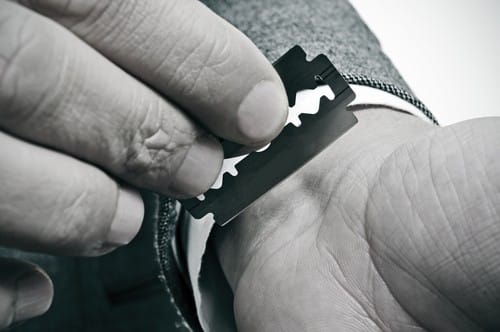When you’re dealing with depression, even simple tasks like getting out of bed or putting on new clothes can feel like an insurmountable challenge. Motivation isn’t always enough. Routines, healthy habits, and professional treatment are important. Find out how to support your teen and get them the help they need to manage depressive thoughts and combat them effectively.
A teenager struggling to get out of bed in the morning is fighting to find a reason to exist. They want to feel better, feel happier, do things, and experience joy. But with depression, it can seem like there’s a huge wall between what they want, and what they’re currently capable of.
Pulling them out of bed might help get them on their feet when they otherwise can’t, but it’s not a good long-term solution. If you want to help your depressed teenager out of bed at a consistent rate, then you will need to help them address depression – and everything that comes with it.
Is It Depression?
When it comes to getting a depressed teenager out of bed, stern voices and stiff arms will not help; what you need, first and foremost, is the patience of a saint.
Depression is a difficult and insidious condition. It disguises itself as our own voice, doing nothing but bringing us down thought by thought. Neurologically, there are numerous different suggested pathological theories for how mood disorders like major depressive disorder develop – differences in the transfer of information across synapses, brain chemical deficiencies, imbalances, endocrine disorders. Some of these theories have more evidence than others, but there is no clear answer.
In many cases, genes have a role to play. In most cases, there are environmental risk factors that exacerbate and reaffirm negative thinking, such as abuse, stress, grief, or poverty. Depression isn’t just like feeling sad – it’s about feeling low. Low energy, low mood, low self-esteem. That feeling remains consistent, even in the face of something to smile about.
Signs and symptoms of depression in teens include:
- A constant low mood, at home, at school, and everywhere else.
- Loss of interest in old hobbies and activities.
- A sudden change in friends, or social isolation.
- A jump in reckless behavior and uncharacteristic risk-taking.
- A much lower self-esteem than usual.
- Restlessness, or oversleeping.
- Chronic mental and physical fatigue.
- Unexplained pains with no physical cause.
- Evidence of self-harm.
Only a doctor can assess and diagnose a mood disorder like depression in a teen. If you are worried about your teen’s mental health, talk to them about visiting a mental health professional together.
Related: 9 Warning Signs of Adolescent Depression
Open Communication
One of the best things friends and family can do to help address depression is to talk about it and talk about it openly. If you or another loved one have had experience dealing with a diagnosed mood disorder, then talk about how you felt. Emphasize sharing your feelings. Emphasize the fact that your teen is not alone, even among friends and family, for feeling inexplicably and randomly sad.
Acknowledging that depression exists helps teens identify their negative thoughts and feelings with being depressed and begin isolating some of that negativity with the context of a mental health issue, rather than an inherent personal quality. Being depressed isn’t part of who your teen is – it’s something they’re experiencing. And there are ways to fight it.
Set Realistic Goals
Sometimes, depression can spiral with a negative, recursive thought. A teen might get hung up on the fact that they can’t seem to get out of bed. They feel guilty and chastise themselves for being too powerless for something so “simple”. They feel empty and disillusioned. “Why even bother”, they might think. Then they turn over one more time. They wake up, and the cycle repeats itself.
Goal setting can be a positive way to combat this line of thinking for teens with depression. We aren’t talking about long-term goals here, but short, realistic, daily to-do lists. Something like drinking a certain amount of water each day, or remembering to have a small breakfast, or consistently waking up at a certain time.
You will need to help your teen set and achieve these goals, for a while – until they become routine.
Establish a Routine
Short-term goals lead to healthy habits and a consistent routine. Prioritize elements in a routine that are proven to help manage negative thoughts: a healthy sleep cycle with enough daily rest, some exercise, and a better balance between a teen’s daily responsibilities and their personal recreation. Motivation comes and goes. But self-discipline and consistency can provide structure and a sense of stability – and help boost a teen’s self-esteem.
Reinforce the Routine
There will be days when your teen won’t drink enough water. There will be days they can’t seem to fall asleep until late into the night, and struggle to wake up. There will be days where the routine breaks, the thoughts get stronger, and the feelings of failing – of being bad – creep back up.
Don’t judge, don’t chastise. Your teen is doing more than their fair share of both, and it’s simply pushing them further down. When the routine breaks, help your teen get back into it. The sooner, the better. Be gentle. But be persistent.
Seek Professional Help
Parents can do much at home to help support their teen. But if it becomes clearer that this isn’t just a depressive episode, but something more long-term, then it becomes important to consult a mental health professional.
Involve your teen in their treatment decisions! Review your options together. Visit therapists or counselors. Learn about how different treatment options work together.
Talk therapy and medication are effective first-line treatments for teen depression and can help teens bring their emotional baseline to a point where their healthy habits and routines – which you can reinforce at home – help build the emotional resilience needed to strongly resist another depressive episode in the future.
Having access to mental health resources is also important when your teen decides that they need more help, or if they want to learn more about identifying symptoms when they appear. If you’re concerned about your teen’s mental health, consult a mental health expert who can provide guidance and support tailored to their needs.
We at Visions specialize in providing residential care for teens with serious mental health issues, such as major depressive disorder or bipolar disorder. If your teen has been struggling with their low mood for a while, then consider giving us a call today.









